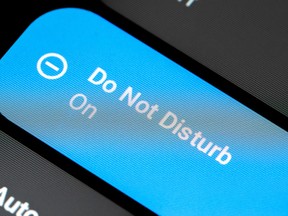[ad_1]
Much of the generation avoids calls and other alerts by turning on their devices’ Do Not Disturb feature

Reviews and recommendations are unbiased and products are independently selected. Postmedia may earn an affiliate commission from purchases made through links on this page.
Article content
Generation Z is known for being fully immersed in digital communication. However, they don’t seem to be eager to answer a phone call.
Recent data have shown that 90 per cent of Gen Z are anxious about having to speak on the phone, CBS reported. This has lead to much of the generation avoiding calls. However, silent or vibration mode isn’t good enough for this generation. Gen Z prefers to eliminate all unexpected notifications by turning on their devices’ Do Not Disturb features.
Advertisement 2
Article content
Article content
Katherine Gorelik, a fourth-year architectural studies student at the University of Toronto, said she uses Do Not Disturb for this reason.
“I get very anxious whenever I get something that I’m not prepared for, such as a phone call,” she said. “I prefer texts and emails because I need to process things on my own time if it’s something super important.”
Recommended from Editorial
-

Gen Z finance terms, explained: From loud budgeting to doom spending and girl math
-

How Gen Zs have shaken up the multibillion-dollar fragrance industry
Gorelik said this anxiety comes from not being able to prepare prior to receiving the call, causing her to feel as though she may have trouble formulating an articulate response.
“For me, it’s the way I formulate my thoughts and how I respond. I always need to take a bit more time to think about the way I’m responding to someone,” she said. “If something catches me off guard over a phone call, I won’t be able to give the best response and will end up constantly overthinking it.”
Tero Karppi, an associate professor at the Institution of Communication, Culture, Information and Technology at the University of Toronto, said a “change in the communication landscape” has influenced how people prefer to contact one another.
Article content
Advertisement 3
Article content
“Phone calls carry this expectation that whoever you are calling is immediately able to answer that call,” he said. “With social media, we no longer have those immediate response expectations. We know that people will respond when they have time so there’s no expectation that they need to respond instantly.”
According to a study commissioned by Sky Mobile, 47 per cent of Gen Z said they would prefer to be texted before being called, “so they know to expect it.”
Experts in the journal Cyberpsychology, Behaviour & Social Networking say that the fear of phone calls is associated with social anxiety, causing some to experience “a combination of fear, apprehension and worry.”
While this phone phobia is a common cause of Gen Z using Do Not Disturb, there are other reasons for the recent increase in this feature’s usage.
Many Zoomers are currently at the age where school takes up a large portion of their lives. It can be difficult for students to focus their attention on studies, especially when phones offer plenty of distractions, from phone calls and texts, to a steady stream of social media notifications.
Advertisement 4
Article content
“You would get notifications (from) many things,” said Karppi. “The phone would make all sorts of signals that would feel disturbing to you. If you need to concentrate or focus on something, sleep or take a nap, you probably want to set the phone into Do Not Disturb to block it from constantly beeping in your pocket.”
First-year University of Guelph-Humber business administration student Salvatore Figliuzzi said he needs Do Not Disturb to help him stay focused on his academic responsibilities.
“I usually put my phone on Do Not Disturb because of the distraction,” he said. “Any time I receive a notification, I tend to feel obligated to look at it. Now that I’m in university and the (content) is more condensed, I need to limit myself to improve my habits.”
Leah Mascarenhas, a third-year professional communication student at Toronto Metropolitan University, said she uses Do Not Disturb to make sure she doesn’t get distracted before going to sleep at night — one of the more widespread uses of the function among older generations.
“If I didn’t have Do Not Disturb, it would be stressful because I’m a really light sleeper,” she said. “If I hear a notification go off, I want to check my phone.”
“The more we can implement the Do Not Disturb feature, the better,” said Gorelik.
Article content




